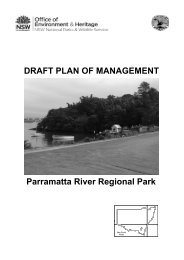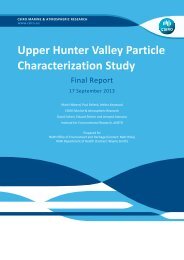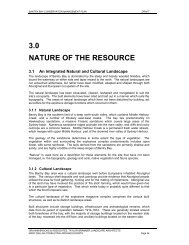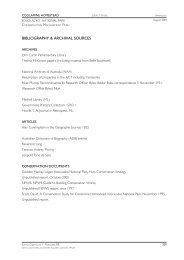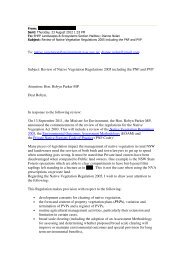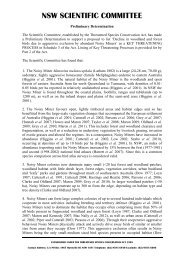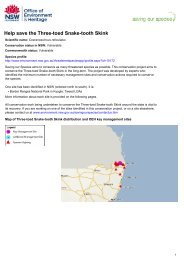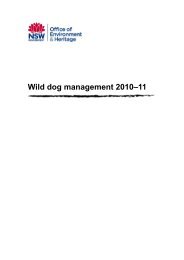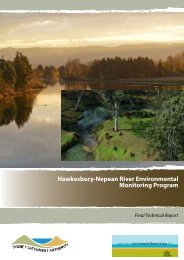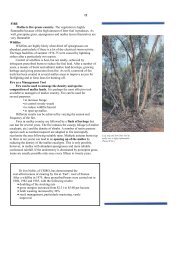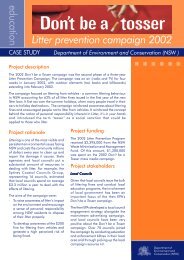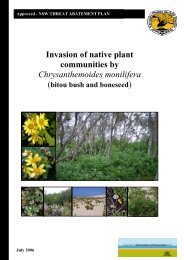Progress Report 2007-2008 - Department of Environment and ...
Progress Report 2007-2008 - Department of Environment and ...
Progress Report 2007-2008 - Department of Environment and ...
Create successful ePaper yourself
Turn your PDF publications into a flip-book with our unique Google optimized e-Paper software.
Due date Region FA section Milestone <strong>Progress</strong><br />
Employment <strong>and</strong> training opportunities<br />
2000 1 April<br />
UNE,<br />
LNE<br />
5.1.2<br />
Preparation <strong>of</strong> a joint strategy to facilitate an<br />
employment <strong>and</strong> development program for Aboriginal<br />
people..<br />
The Cultural Resource Use Framework applies to all NSW Government l<strong>and</strong>s <strong>and</strong> requires agencies (including DECC <strong>and</strong> Forests<br />
NSW) to develop operational guidelines. This work is also linked to the access policy called ‘On Country’, which was developed under<br />
Two Ways Together<strong>and</strong> is making access agreements for l<strong>and</strong>s <strong>and</strong> waters in New South Wales. It is available at:<br />
www.daa.nsw.gov.au/publications/64.html<br />
The South Western Slopes Region <strong>of</strong> the Parks <strong>and</strong> Wildlife Group organised <strong>and</strong> participated in two women’s, one youth <strong>and</strong> one<br />
family cultural camp. The region held various Discovery <strong>and</strong> NAIDOC events in Kosciuszko NP during the Easter <strong>and</strong> Christmas<br />
periods <strong>and</strong> NAIDOC week <strong>and</strong> numerous Discovery events with schools, community groups <strong>and</strong> local festivals <strong>and</strong> fairs over the year.<br />
Over 1650 adults <strong>and</strong> 2050 children participated or attended these events; 165 adults <strong>and</strong> 430 children attended NAIDOC week<br />
celebrations. A new Aboriginal Discovery Cultural tour was developed called Wiradjuri Wonders focusing on bush tucker, bush craft<br />
<strong>and</strong> traditional pathways through Nth Kosciuszko NP.<br />
Regional ESFM plans identify Forests NSW’ commitment to allow local Aboriginal communities access to forest resources for<br />
traditional/cultural purposes. Forests NSW responds to specific requests from Aboriginal communities for access to forest resources.<br />
During <strong>2007</strong>–<strong>2008</strong>, one Aboriginal group was issued with a commercial firewood collection licence.<br />
No <strong>Report</strong>ing Required<br />
A joint DECC <strong>and</strong> Forests NSW strategy has not been developed. However, DECC <strong>and</strong> Forests NSW have each continued to<br />
implement related initiatives.<br />
DECC’s initiatives include an Aboriginal Employment Strategy to facilitate employment <strong>and</strong> development opportunities for Aboriginal<br />
people. In 2006–<strong>2007</strong>, 7.5% <strong>of</strong> the DECC workforce identified since (2004–2005) equates to around 300 people. This increased to 8%<br />
in <strong>2007</strong>–<strong>2008</strong>, (representing a 2% increase since 2004–2005) <strong>and</strong> equates to around 300 people. This figure is above the NSW<br />
Government benchmark <strong>of</strong> 2% Indigenous employment. Additionally, DECC employs contract <strong>and</strong> casual Aboriginal staff for work that<br />
includes the Discovery Ranger program, research projects <strong>and</strong> l<strong>and</strong> management activities (e.g. weed control), amongst others. Joint<br />
management <strong>and</strong> ventures have also provided additional employment <strong>and</strong> industry development <strong>and</strong> economic opportunities.<br />
In <strong>2008</strong>, DECC established an additional seven Aboriginal cadetships making a total <strong>of</strong> 17. Through the Aboriginal cadetship program,<br />
cadets participate in full-time study <strong>and</strong> 12 weeks <strong>of</strong> practical work experience each year to complete their undergraduate degree, with<br />
guaranteed employment on successful completion.<br />
DECC has also entered a partnership arrangement with the Western Institute <strong>of</strong> TAFE to provide Aboriginal traineeships, which will<br />
lead to the nationally recognised qualification <strong>of</strong> Certificate II in conservation <strong>and</strong> l<strong>and</strong> management. The traineeships are for 12<br />
months <strong>and</strong> allow trainees to combine full-time practical work with structured training sessions throughout the year. The <strong>2008</strong> intake<br />
comprises 11 new trainees in trainee field <strong>of</strong>ficer <strong>and</strong> trainee interpretive assistant positions. DECC’s recruitment <strong>of</strong> trainees<br />
complements the Aboriginal cadetship program.<br />
UNE/LNE<br />
Aboriginal employment as a result <strong>of</strong> funding provided for management <strong>of</strong> additions to the reserve system has been implemented. In<br />
addition to positions created during 2005-06 (seven permanent Aboriginal positions) <strong>and</strong> the identification <strong>of</strong> an existing position as an<br />
Aboriginal position, further positions have been created following the finalisation <strong>of</strong> agreements with the Githabul <strong>and</strong> Worimi peoples.<br />
Approximately 12% <strong>of</strong> staff employed in DECC’s Parks <strong>and</strong> Wildlife Group Northern Branch identify as Aboriginal.<br />
NSW FOREST AGREEMENTS AND INTEGRATED FORESTRY OPERATIONS APPROVALS 121




